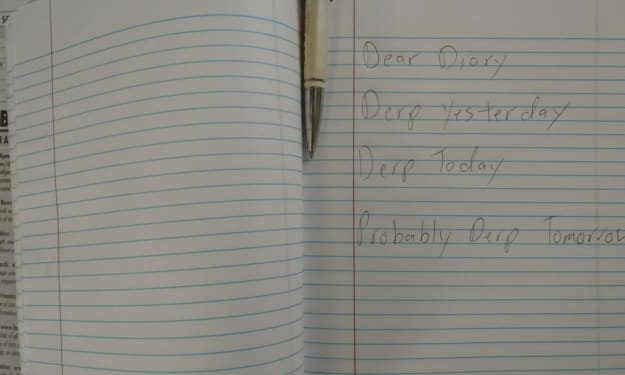Why Doesn't Practice Seem to Help Me Get Better at Writing?
A practical guide to writing better.

Why doesn't practice seem to help me get better at writing?
This is about the best question anyone has ever asked me. In a way, I’ve been beating around the bush throughout all of my articles regarding the art of editing as to why practicing writing doesn’t help one to write better.
As usual, I wanted more information from my client; what was she writing? How long had she been writing? What were her overall goals? The following was part of her reply:
No matter how many times I sit down to write a piece of fiction, I never see any improvement in my writing. Why is this? I know that practicing is a great way to get better at something, but it doesn’t seem to be helping my writing at all. Any advice would be helpful!
First of all, I’m certain there were subtle improvements. There must have been! Otherwise she could not have noticed that her writing needed improvement. See?
Here’s the thing….
Consider sculpting or pottery. If you want to become a great sculptor of clay statues, how do you begin? By making bowls on a pottery wheel, probably. If all you make is bowls on a pottery wheel, you’ll never get any better at doing anything outside of bowls on a wheel. Feel me? Even then, your bowls might suck....
You have to compare and contrast your bowls to the great bowls of the times. You have to show people your bowls, and ask them what’s good, what needs improvement, and why? You have to ask other “bowl makers” what they’re doing, and compare and contrast with them as well. It’s a learning process, but you also have to do more than just make bowls on a wheel.
How can you do more than just bowls on a wheel? Well, you can track down someone who does more than just bowls on wheels, and ask them to show you what’s wrong with your work. Don’t get butthole hurt when they point out what’s wrong with your work, though.
So, here’s the deal; I’m gonna’ lay it out for you guys like I laid it out for this woman.
- There is nothing wrong with your writing. You have to understand that what you write is just a first draft. You must understand that a first draft is just a first draft, and basically, it’s supposed to suck! Now, make a copy of your original story as you had it when you finished it. You will need a copy of your original, rough draft.
- You must go through your first draft, and change everything you don’t like. You cannot do this in one single read-through. You will have to go through your story dozens of times—not kidding—at least 20 before you’re ready to publish.
- Once you have your story to a point that you no longer hate it, find some peers to review it and give you some suggestions. Until you’re a successful, wage earning writer, you need to take advantage of writing groups. You can find them all over Google+, LinkedIn, and even Goodreads.
- Take everyone’s critique with a grain of salt. Look at their suggestions objectively. Most likely, no one is out to offend you, and if they are, don’t deal with them. Do Not Deal With Negative People. Anyone can find a nice way to let you know your story sucks. People who do try to offend you aren’t worth your time. Get some tough skin now because you’re opening yourself to the public eye by publishing stories.
- Mull over the suggestions. Read them again and again, and when you think something makes sense, try it out. You’re still not published. You’re still drafting, so try different things, and try to learn from others. Try the changes. Don’t like ‘em? Don’t keep ‘em.
- Read through your story and the changes you made after peer reviews. If you like the result, move on to the next step. If you don’t like it, keep working. Editing your story should be harder than writing it! Editing your story should make you want to choke the person who wrote it…yes, you.
- Find beta-readers. Do Not Ever Pay Anyone To Beta-read. Beta-readers are basically people who enjoy reading rough drafts because they show more of the writer’s spirit than fully edited, ready-for-print stories, which have been modified in order to please an audience. These people do not charge you because they are happy to read drafts and give you their two cents. The more readers you can get, the more versatile will be the suggestions. Apply the ones you like, and forget the rest. Keep Your Ego Out Of Editing! The book is for an audience, right? The book is not for you…right?
- Read through your story after you’ve applied the suggestions from beta-readers. Now, remember the copy of your original, rough draft I made you keep? Go back and read it. It sucks, right? Can you see what’s different between your new version and the original? It’s okay if you can’t really tell, but try to pick out why something sucked and how other people’s suggestions have helped you to improve.****Here’s a little example****He nodded his head before he got into the car. Once inside, he waved his hand, and Lena trotted off. He would have liked to have kept her closer, but he knew that their love was not meant to be; he was leaving the country.My personal advice about the paragraph above, and it’s a very real paragraph that newbie authors write, is that the whole thing is wrong, but you see this kind of thing in first drafts. I draft like this, but I do not publish like this!He nodded his head? What else is there to nod? He nodded.He waved his hand? He wasn’t holding anything. There was nothing else to “wave”, so: He waved.He would have liked? Did he? How about: He wanted her closer?He nodded before hopping into his car. Once inside, he slowly brought his eyes to meet hers. Then, he waved slowly, forever trying to burn the image of her emerald jewels into his memory.A giggle escaped Lena’s lips as she trotted off. He wanted to keep her close—it was impossible—not only was he leaving, he was leaving the country to research a heinous plot likely to end in his demise.****The first example told you what was going on. The edited example made you feel, believe, and experience what the first example was telling you. Editing; it’s crucial!****
- Get away from your book. Forget all about it. For now, immerse yourself in sites like Purdue Owl. Learn some editing techniques. Find out who the good editors are. Most of them will have great websites where they also give great advice. See if you can find some editors who will take a look at some of your work for free, or if you can, see if you can hire an editor who will take as much or as little work as you’d like to offer. (Someone to whom you can submit 5 pages for editing to see if you like them.)
- Hire an editor. A real editor is an artist who can help you to showcase the story, thoughts, emotions, and beauty from between the words. A real editor is someone who transforms your account of events into a story for an audience. An editor is an interpreter, and though you may not want to dish out $1,000 for an editor, you probably should, especially for your debut novel. Just be sure to find an editor who will work with you and explain why they suggest their changes.
- These steps can help anyone become a better writer, but did you notice how many of the steps dealt with editing? Writing your book is the easy part. Anyone can write a book. All you need to do is write your thoughts down; that’s the easy part. It doesn't have to be good, complete, make sense, or anything.
Editing your book should take you at least twice as long as writing it, and by the time you’re done, there shouldn’t be but a shred left of your original thoughts. Editing helps the accounts become a story. It helps the characters become people. You can’t just sit down and pound out a book; it’s a process.
You have to write some. Read what you wrote. Don’t get hung up on whether it’s perfect. Write more, read more, do some light editing, and then, when it’s all done, you can look at the whole thing to see if it’s cogent, consistent, entertaining, but you alone, can’t do it, not on your first try.
All the best writers have teams of editors. The publishing companies employ editors for a reason. You Need An Editor.
Can you see that this is rather tough to learn if you’re an aspiring writer trying to get that debut novel done and out?!
This is precisely why I tell all of you to learn to write short stories. Practice them. Publish them to your blogs. Invite comments. Edit them. Republish them. Learn to write fan-fiction. Hire some editors for your fan-fiction, so you can get an idea of what to seek out in a good editor. Build a fan base from writing good shorts and fan-fiction, and then, when you’re taking 2 years to write and edit your debut novel, you’ll have a fan base dying to buy it. You can even release portions of it to your blog, and get feedback from your fans.
Keep your ego out of the way. Listen to others. If you don’t like what they have to say, ignore them. If you do like it, make the modifications to your writing. Engage your intended audience. Learn from editors. Many of us are here to help you.
You can learn more about my editing services here. Thanks for reading.
About the Creator
Aaron Dennis
Creator of the Lokians SciFi series, The Adventures of Larson and Garrett, The Dragon of Time series, and more.






Comments
There are no comments for this story
Be the first to respond and start the conversation.